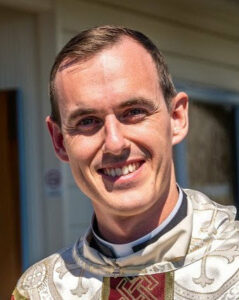On the Synodal Journey

By Fr Hayden Powick SM
As Catholics, we believe that the Holy Spirit continues to guide the Church into a fuller understanding of the divine mysteries of Christ’s life, death, and resurrection. Jesus himself tells us as much: “the Advocate, the Holy Spirit, whom the Father will send in my name, will teach you everything and remind you of all I have said to you.” It is in the heart of the Church that the Holy Spirit continues His work of reminding and teaching. It is only in the heart of the Church, in union with the successors of the Apostles, that we can be sure of resting in the single fountain of divine truth.
Our secular New Zealand culture is at odds with this claim. Many people have given up on the possibility of a shared ‘continent’ of Truth and content themselves with a number of disconnected ‘islands’ of little truths. Conflicting religions, moral systems, and ideologies are seen as all equally valid and people arbitrarily choose whatever ‘truth’ tickles their fancy.
This subjective mentality can creep into the Church too. Catholics can drift away from the heart of the Church and strand themselves on little islands of extreme ‘conservatism’ and ‘liberalism’. I believe that Pope Francis was (and is) concerned about the growing fragmentation and polarisation within the Church and instituted the Synod on Synodality to help restore visible unity.
“To hold a ‘synod’ means to walk together. I think this is truly the most wonderful experience we can have; to belong to a people walking, journeying through history together with their Lord who walks among us! We are not alone; we do not walk alone. We are part of the one flock of Christ that walks together.”
(Pope Francis, Feast of Francis of Assisi,
4 October 2013)
For our secular culture, the solution to resolving conflict appears to be a sort of managerial dialogue. We visit each other’s ‘islands’ like tourists and try to appreciate ‘the other side.’ The end goal of the dialogue is merely ‘getting along’ while minimising violence and vitriol. However, because our ideological islands are all that are stopping us from drowning in the sea of nihilism1, this sort of dialogue can never really critique; the criticism of a particular ideology becomes an attack on someone’s very identity. This explains the paradox of intolerance and ‘cancel culture’ in a society which lauds itself on inclusivity.
The solution is not secular dialogue, but a return to the shared search for the fullness of the Truth. The danger is that we dialogue and listen to each other, but never budge from our isolated little islands. The Synod on Synodality, or any discussion within the Church, is not about shouting our own rhetoric or even about simply getting along, but about trying our best to stay at the heart of the Church, which we believe is guided and nurtured by God Himself. It is only attached to the vine of Christ’s body that we will bear fruit.
1. Nihilism is the belief that all values are baseless, nothing can really be communicated and that life is essentially meaningless.
 Entries(RSS)
Entries(RSS)